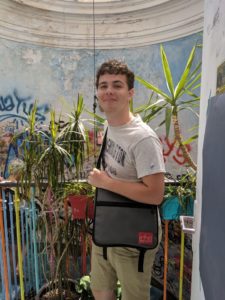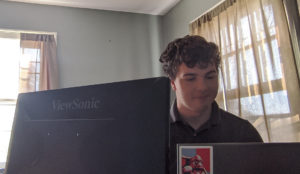History has been a part of Matthew Bova’s life for as long as he can remember. In fact, even longer. The UMW junior’s parents met when they were both historical interpreters at Claude Moore Colonial Farm.

“I feel fortunate to have grown up in an area so rich in history,” said Bova, an Arlington, Virginia, native who spent his childhood volunteering at the Northern Virginia site, and visiting national landmarks on family vacations. “It played a pretty important role in my upbringing.”
He knew he’d be at home when he discovered that the University of Mary Washington offered a historic preservation major, one of only four in the country for undergraduates. His time spent exploring centuries-old artifacts and architecture in Fredericksburg and throughout Virginia – and as far away as France – helped land him a competitive Library of Congress (LOC) junior fellowship this summer.
“I had never even heard of the field before coming to UMW,” said Bova, who quickly put his studies to work volunteering with the George Washington Foundation in Fredericksburg. He gave tours of the Kenmore House, former home of Betty and Fielding Lewis, the first president’s only sister and her husband, which is now a National Historic Landmark.
As he led visitors through the candle-lit halls of the 18th-century plantation home that served as a makeshift hospital for the Union Army during the Civil War, Bova said, he learned how to craft a narrative to give tourists a lasting impression of the site.
His research also took him to Isle of Wight, Virginia, just south of the James River. Working with UMW peers last fall, Bova helped catalog graves in the historic Ivy Hill Cemetery, documenting the names, text and artistry on each headstone. While the students could only cover a small portion of the grounds that weekend, Bova said, the experience was so rewarding that he declared geography as a second major.


Before the pandemic hit, he got the chance to combine skills from both majors, helping his advisor, Assistant Professor of Historic Preservation Lauren McMillan, survey an archaeological site.
“Matthew’s passion and enthusiasm for historic preservation and archaeology are infectious,” said McMillan, who watched Bova demonstrate how to use an atlatl – an ancient spear thrower – at a department-hosted conference last fall. “He was great with the public as he explained experimental archaeology, a field in which we learn how to make and use the objects we excavate and research.”
Bova also traveled to Paris for a month-long study abroad trip led by Professor of Historic Preservation Andréa Livi Smith. Covering everything from history and urban planning, to contemporary issues like the reconstruction of Notre Dame, the group explored the city’s famed arrondissements, as well as neighborhoods and nooks known only to Parisians.

He intended to spend this summer a little closer to home in Washington, D.C., but once the COVID-19 pandemic took hold, he learned he’d be completing his LOC junior fellowship – his first full-time job – remotely.
His last month was spent applying coding skills he gained at UMW to write a computer program to access digital items from the Latin American and Caribbean countries colonized by Spain and Portugal in the early 16th century in the LOC’s Luso-Hispanic division. The work has helped prepare him for his next two years at Mary Washington and beyond.
“I’m hopeful it will lead to more opportunities once this crisis is over,” said Bova, who plans to pursue a career in archaeology. “Being a part of UMW’s historic preservation department and this experience with the Library of Congress will help me reach my goals.”

